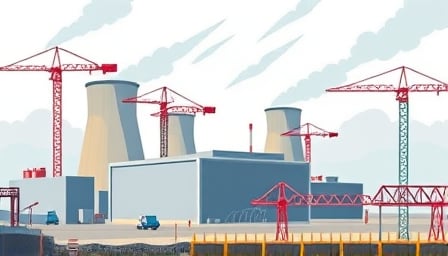Ferrovial SE Positions Itself for Poland’s First Nuclear Power Plant, Reinforcing Infrastructure Leadership
Ferrovial SE, the Spanish multinational that specialises in infrastructure development, construction and logistics, has recently attracted attention both for a high‑profile family event and for a strategic contract in Poland. While the former has no direct bearing on the company’s financial metrics, the latter signals a potentially significant expansion in the firm’s portfolio and offers insights into broader industry trends.
Strategic Implications of the Polish Nuclear Project
Poland’s first nuclear power plant, a flagship project aimed at diversifying the country’s energy mix, has been awarded to a consortium of Spanish firms: Ferrovial, Acciona, and ACS. The collaboration involves substantial capital outlays, sophisticated engineering, and long‑term operational commitments. Ferrovial’s role in this endeavour underscores several key points:
Technological Credibility
The selection process for the Polish project emphasised not only financial robustness but also proven technical expertise in large‑scale civil engineering, safety compliance, and project management. Ferrovial’s track record in complex road and bridge construction, as well as its experience with airport and port infrastructure, positions it favorably in this context.Geopolitical Alignment
Europe’s energy policy is increasingly focused on decarbonisation and energy independence. By participating in Poland’s nuclear development, Ferrovial aligns itself with the European Union’s strategic priorities, potentially opening doors to further public‑sector contracts across the continent.Long‑Term Revenue Streams
Nuclear projects typically span 10–15 years from inception to operational handover. This long‑haul timeline offers Ferrovial a predictable cash‑flow stream, diversifying its revenue profile beyond the more cyclical construction and maintenance contracts that dominate its traditional business.
Market Performance and Investor Perception
From a financial standpoint, Ferrovial’s share price has displayed relative stability in recent trading sessions, with fluctuations confined to a modest range. The absence of any significant price erosion suggests:
Investor Confidence in Core Competencies
Market participants appear to recognise Ferrovial’s strong foothold in the infrastructure domain, reflected in a price‑to‑earnings ratio that remains within industry norms.Risk Mitigation Through Diversification
The company’s balanced portfolio—spanning toll roads, airports, and now energy infrastructure—has mitigated sectoral shocks, contributing to steadier valuation metrics.Capital Adequacy for New Projects
A stable market cap combined with sound liquidity positions Ferrovial to absorb the upfront capital requirements of the Polish nuclear venture without resorting to high‑cost external financing.
Cross‑Sector Connections and Economic Context
Ferrovial’s expansion into nuclear infrastructure dovetails with several macro‑economic themes:
| Sector | Key Driver | Ferrovial’s Advantage |
|---|---|---|
| Transportation | Demand for high‑speed rail and autonomous logistics | Extensive experience in toll roads and airport operations |
| Energy | Decarbonisation push, energy security | Proven engineering capabilities, long‑term project delivery |
| Public‑Private Partnerships | Governments seeking risk‑sharing models | Strong track record in PPPs, transparent governance |
These intersections reveal that Ferrovial is not merely a construction firm but a versatile player capable of leveraging infrastructure expertise across disparate yet increasingly interlinked industries. Such versatility enhances its resilience against cyclical downturns in any single market segment.
Outlook
The Polish nuclear contract is a milestone that could catalyse further growth for Ferrovial. If the company successfully navigates the technical, regulatory, and financial complexities inherent in nuclear projects, it could position itself as a preferred partner for similar initiatives worldwide. Moreover, the project’s alignment with European decarbonisation objectives may attract additional public‑sector funding, further buoying the company’s financial standing.
In sum, while a recent celebratory event involving the company’s president’s family has generated media buzz, it is the strategic procurement of a high‑stakes energy project that signals true corporate momentum. Ferrovial’s stable market performance, coupled with its expanding operational footprint across complementary sectors, suggests that the firm is well poised to capitalize on emerging infrastructure trends in Europe and beyond.
